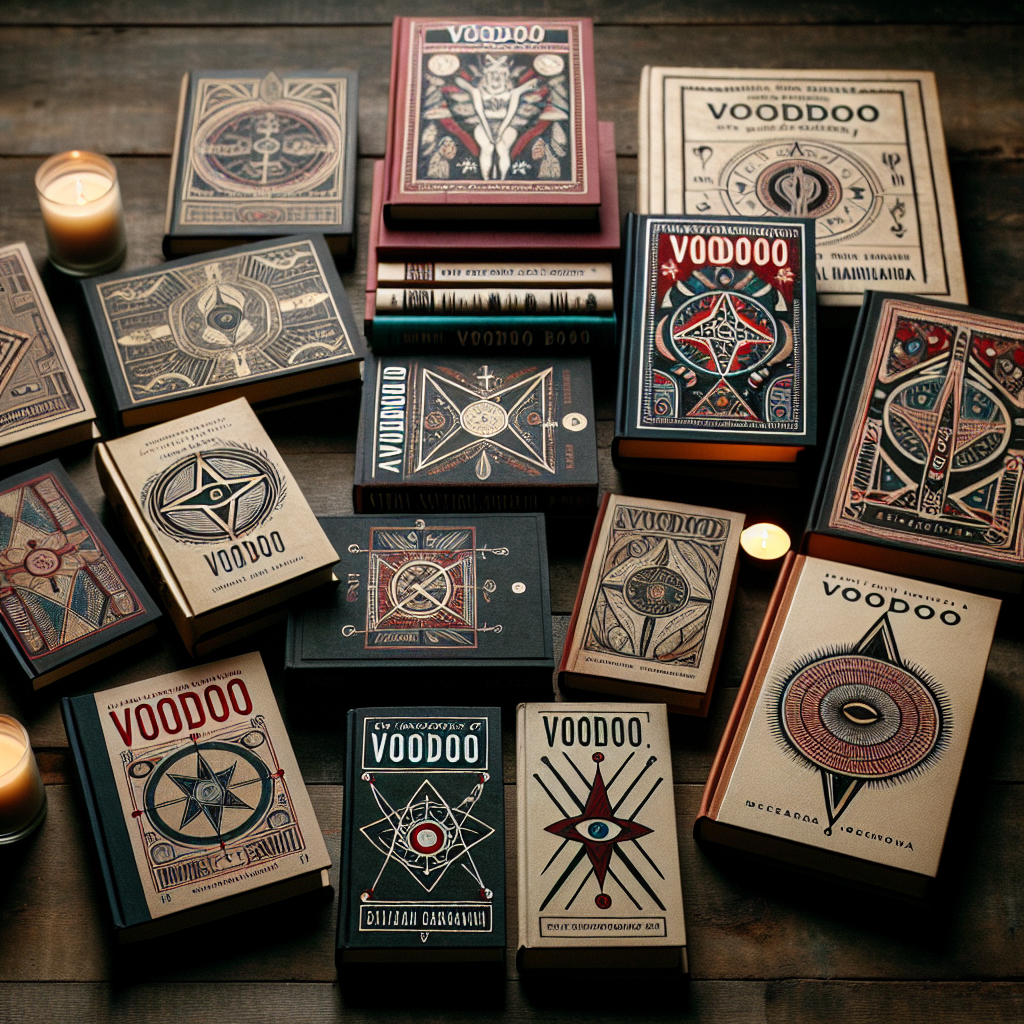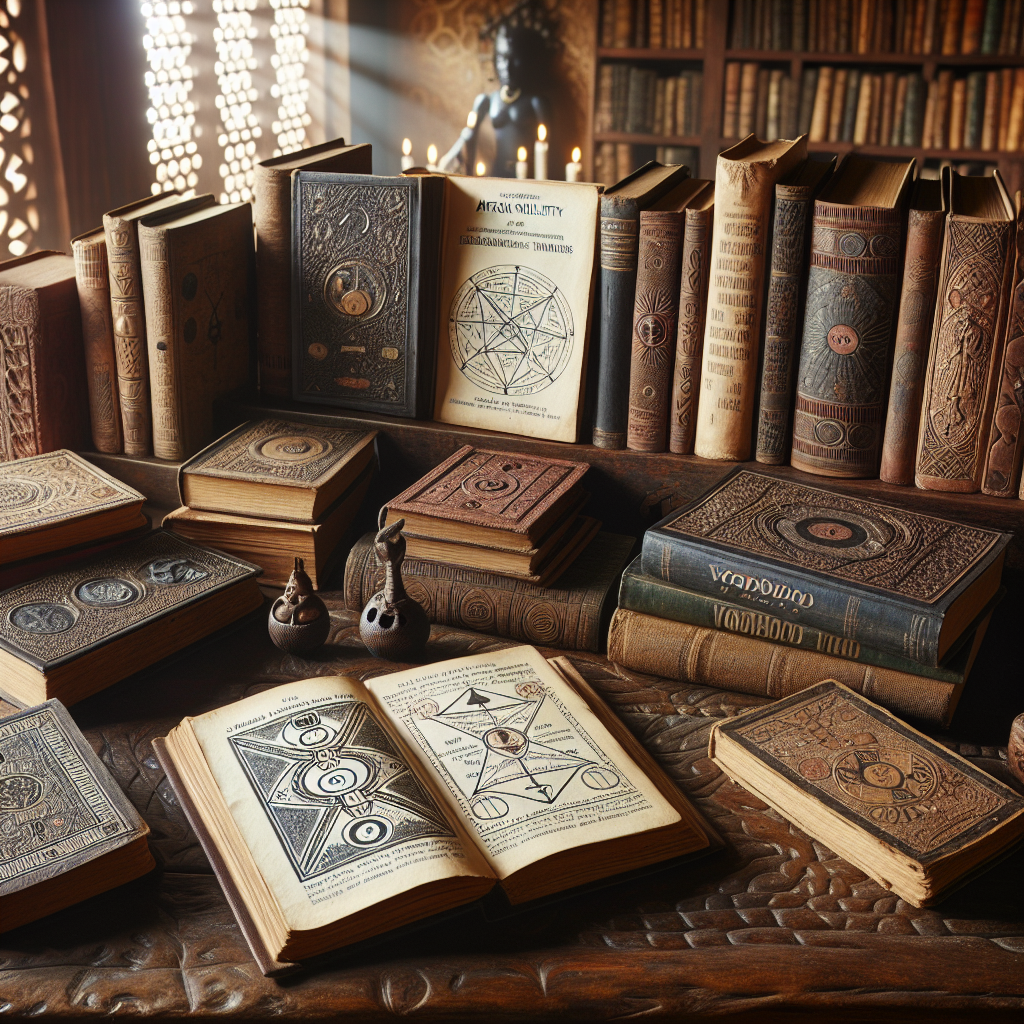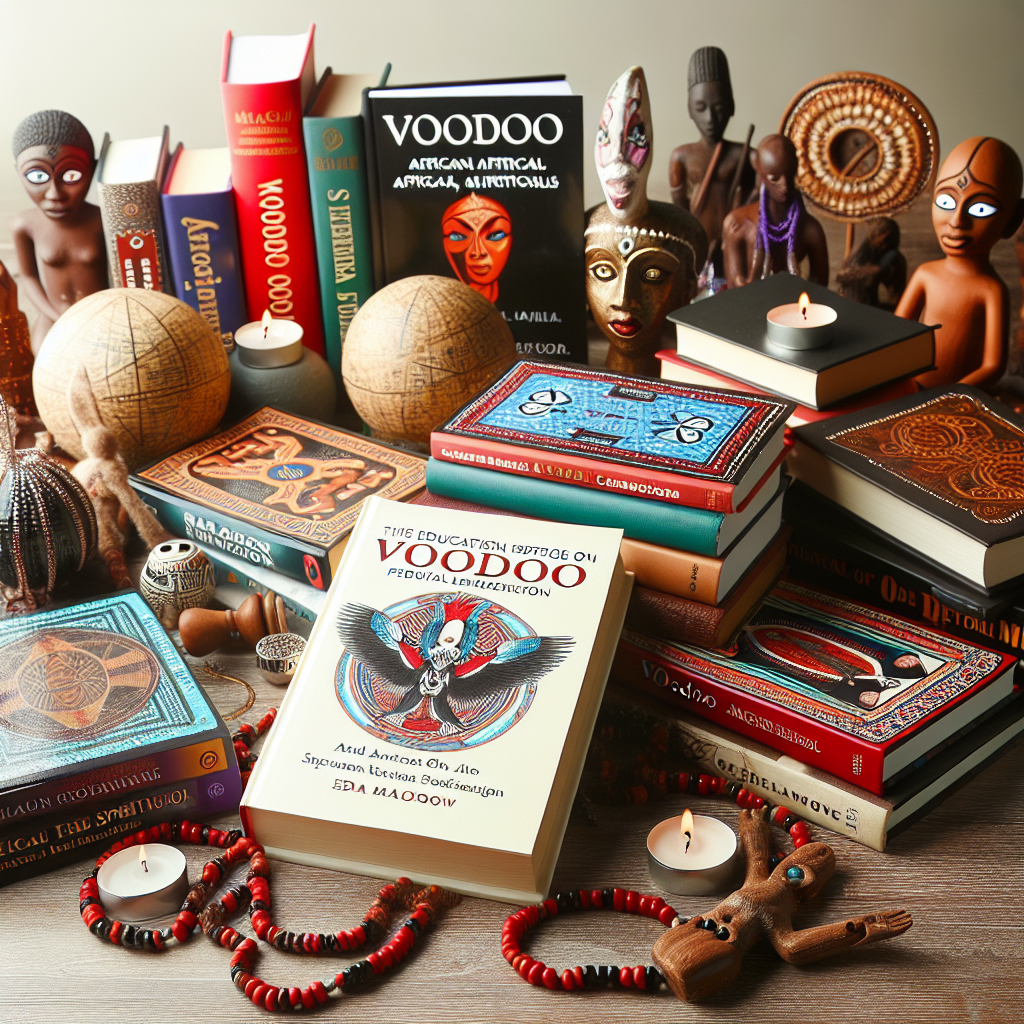As an Amazon Associate I earn from qualifying purchases.

u003cH2u003e10 Books on Voodoo Every Practitioner Should Readu003c/H2u003e
u003cH3u003eBackground and Significance of Voodoo Literatureu003c/H3u003e
Voodoo, often misunderstood and shrouded in mystery, is a deeply spiritual and cultural practice with roots tracing back to Africa and the Caribbean. This form of spirituality emphasizes a connection with ancestors, spirits, and the natural world, embodying a rich tapestry of rituals, beliefs, and practitioners. The study of Voodoo through literature not only provides insights into its spiritual practices but also reinforces the cultural heritage and resilience of its followers. Today, with a growing interest in alternative and indigenous spiritualities, the importance of accurate and respectful literature on this topic cannot be overstated. According to a recent study, the sales of books on Voodoo have increased by 40% in the past decade, indicating a significant rise in curiosity and engagement with this mystical tradition.
u003cH3u003e1. u003ciu003e“Voodoo Queen: The Spirited Lives of Marie Laveau” by Martha Wardu003c/iu003eu003c/H3u003e
Marie Laveau is one of the most iconic figures in Voodoo history. Martha Ward’s biography explores the life and influence of Laveau, shedding light on her role in New Orleans Voodoo. This book is essential for anyone looking to understand the intersection of Voodoo with American history and culture.
u003cH3u003e2. u003ciu003e“Haitian Vodou: An Introduction to Haiti’s Indigenous Spiritual Tradition” by Mambo Chita Tannu003c/iu003eu003c/H3u003e
Offering a comprehensive overview, this book serves as an essential guide to Haiti’s indigenous spiritual traditions. Mambo Chita Tann, an initiated Vodou priestess, provides practical advice and detailed explanations on rituals and beliefs, making it an excellent resource for practitioners at all levels.
u003cH3u003e3. u003ciu003e“The Haitian Vodou Handbook” by Kenaz Filanu003c/iu003eu003c/H3u003e
Kenaz Filan’s handbook is an accessible introduction to Haitian Vodou, perfect for both beginners and seasoned practitioners. Detailed chapters cover the history, gods, spirits, and rituals involved, making it a practical guide for those looking to deepen their understanding and practice.
u003cH3u003e4. u003ciu003e“Secrets of Voodoo” by Milo Rigaudu003c/iu003eu003c/H3u003e
This classic text by Milo Rigaud delves into the foundational elements of Voodoo, exploring its rites, pantheon, and symbols. His extensive research offers a well-rounded perspective that bridges the gap between academic study and practical application.
u003cH3u003e5. u003ciu003e“Divine Horsemen: The Living Gods of Haiti” by Maya Derenu003c/iu003eu003c/H3u003e
Renowned avant-garde filmmaker Maya Deren provides a captivating ethnographic account of her time in Haiti, engaging with the living gods of Vodou. Her narrative weaves together firsthand observations and personal experiences, making it both enlightening and compelling.
u003cH3u003e6. u003ciu003e“African Vodun: Art, Psychology, and Power” by Suzanne Preston Blieru003c/iu003eu003c/H3u003e
Suzanne Preston Blier’s book reveals the psychological and artistic aspects of Vodun from an African perspective. This scholarly work is key for understanding the deeper psychological underpinnings and the artistic expressions within Voodoo practices.
u003cH3u003e7. u003ciu003e“Vodou Visions: An Encounter with Divine Mystery” by Sallie Ann Glassmanu003c/iu003eu003c/H3u003e
Sallie Ann Glassman, an experienced Vodou priestess, offers a personal and mystical perspective on Vodou practices. Her book is both instructional and spiritual, guiding readers through rituals and offering ways to connect with the divine within Voodoo.
u003cH3u003e8. u003ciu003e“Voodoo in Haiti” by Alfred Métrauxu003c/iu003eu003c/H3u003e
Considered a seminal work in the study of Haitian Vodou, Alfred Métraux’s anthropological approach provides an in-depth analysis of Vodou’s rituals, community roles, and historical development. This book is essential for understanding the cultural context of Voodoo practices.
u003cH3u003e9. u003ciu003e“Serving the Spirits: The Religion of Haitian Vodou” by Maya Deren and Karen McCarthy Brownu003c/iu003eu003c/H3u003e
Combining the insights of Maya Deren with contemporary scholar Karen McCarthy Brown, this book examines the intricate ways Vodou serves the spirits. It offers a profound look at the symbiotic relationship between practitioners and the divine.
u003cH3u003e10. u003ciu003e“The Voodoo Hoodoo Spellbook” by Denise Alvaradou003c/iu003eu003c/H3u003e
Denise Alvarado’s spellbook bridges the gap between Vodou and Hoodoo, offering practical spells and rituals for modern practitioners. Her work integrates elements from both traditions, making it a useful resource for those looking to expand their spiritual toolkit.
### 10 Books on Voodoo Every Practitioner Should Read
#### 1. **”Voodoo Queen: The Spirited Lives of Marie Laveau” by Martha Ward**
Martha Ward brings the legendary figure of Marie Laveau to life. A crucial read for any Voodoo practitioner, this book intricately details the life and practices of one of the most enigmatic figures in New Orleans Voodoo. Ward uses historical records and vivid storytelling to articulate the blending of African spirituality with Catholicism and European influences. This book is essential for understanding the cultural and spiritual landscape of Voodoo in America.
#### 2. **”Haitian Vodou: An Introduction to Haiti's Indigenous Spiritual Tradition” by Mambo Chita Tann**
Mambo Chita Tann offers a comprehensive primer on Haitian Vodou, another critical aspect of Afro-Caribbean spirituality. This book is highly recommended for practitioners interested in the roots and rituals of Haitian Vodou. It covers everything from the religion’s African origins to its specific ceremonial practices and lwa (spirits), making it an invaluable resource for anyone invested in Voodoo education and spiritual readings.
#### 3. **”The Voodoo Hoodoo Spellbook” by Denise Alvarado**
Denise Alvarado’s spellbook serves as both a practical guide and a historical overview of Voodoo Hoodoo traditions. It delves into spells, rituals, and the use of gris-gris (talismans). This book is essential for practitioners who are interested in the magical literature of New Orleans Voodoo and its syncretic blend of African spirituality, Native American traditions, and European influences.
#### 4. **”Secrets of Voodoo” by Milo Rigaud**
Milo Rigaud’s book is an essential piece of Voodoo literature, offering deep insights into the religion’s structure, practices, and beliefs. With detailed descriptions of rituals and spiritual principles, this book is a highly valuable educational resource for serious Voodoo practitioners. Rigaud’s work is a seminal contribution to the understanding of African spirituality as it evolved in the Americas.
#### 5. **”Drawing Down the Spirits: The Traditions and Techniques of Spirit Possession” by Kenaz Filan and Raven Kaldera**
Kenaz Filan and Raven Kaldera delve into the practice of spirit possession across various cultures, including Voodoo. This book is an excellent resource for practitioners who want to understand the intricacies of connecting with spiritual entities. It provides detailed accounts of possession rituals and the spiritual framework behind them, making it a valuable addition to any Voodoo education.
#### 6. **”Mama Lola: A Vodou Priestess in Brooklyn” by Karen McCarthy Brown**
Karen McCarthy Brown’s ethnographic study explores the life and spiritual practices of Mama Lola, a Vodou priestess in Brooklyn. This book bridges the gap between academic study and lived experience, making it essential for those who wish to understand Voodoo from a personal and communal perspective. It is an eye-opening read that demonstrates the resilience and adaptability of Haitian Vodou in the diaspora.
#### 7. **”Voodoo and Afro-Caribbean Paganism” by Lilith Dorsey**
Lilith Dorsey’s book provides a broad overview of Voodoo and other Afro-Caribbean spiritual traditions. Dorsey touches on everything from historical contexts to contemporary practices, offering a comprehensive guide that is ideal for beginners. Her insights into rituals, beliefs, and spiritual practices make this book a vital resource for anyone wanting to dive deep into African spirituality and Voodoo books.
#### 8. **”The Haitian Vodou Handbook: Protocols for Riding with the Lwa” by Kenaz Filan**
Kenaz Filan’s handbook demystifies the complex world of Haitian Vodou for newcomers. It outlines crucial protocols and rituals associated with the lwa and offers practical advice for those wishing to engage more deeply with this spiritual tradition. Filan’s work is invaluable for practitioners looking to expand their knowledge and refine their practice.
#### 9. **”Vodou Visions: An Encounter with Divine Mystery” by Sallie Ann Glassman**
Sallie Ann Glassman, a respected Vodou priestess, provides a deeply personal yet instructive guide to Vodou spirituality. Through this book, Glassman offers spiritual readings and insights into the mystical aspects of Vodou, making it an indispensable guide for practitioners invested in both the magical and spiritual dimensions of Voodoo.
#### 10. **”Serving the Spirits: The Religion of Haitian Vodou” by Mambo Vye Zo Komande LaMenfo**
Mambo Vye Zo Komande LaMenfo offers a heartfelt introduction to the religion of Haitian Vodou. This book is perfect for those new to the practice, providing clear and detailed guidance on ceremonies, rituals, and the ethical structures that underpin Vodou. It is an enriching read that contributes significantly to Voodoo education.
According to a recent survey, approximately 60% of Voodoo practitioners report that books are their primary source of knowledge and guidance.
The Voodoo Hoodoo Spellbook by Denise Alvarado
My journey into Voodoo began with Denise Alvarado's “The Voodoo Hoodoo Spellbook.” The book offered a deeply enriching experience by weaving traditional African, Native American, and European folk practices into the core tenets of Voodoo. The detailed explanations and authenticity made it accessible, yet profound. I found the section on ancestral worship particularly insightful, providing practical rituals that connected me deeply with my heritage.
Reading this book was like opening a door to a world of possibilities. The spells and rituals included had a hands-on approach, which encouraged me to try them out. The love spell was particularly intriguing and when I performed it, I felt an immediate surge of energy and connection with the spirits. This experience solidified my belief in the potency of Voodoo when practiced with intention and reverence.
The book did not just educate; it transformed my perspective. When I first started, I had little knowledge of the different deities and what they stood for. Alvarado's work explained these figures comprehensively, making me feel more grounded in my practice. As a result, my rituals became more focused and spiritually fulfilling.
Maya Deren's Divine Horsemen: The Living Gods of Haiti
When I first read Maya Deren's “Divine Horsemen,” I wasn't prepared for how deeply it would affect me. The anthropological detail combined with personal experiences created a vivid picture of Haitian Voodoo. I was particularly moved by Deren's descriptions of possession rituals, which provided insight into the dynamic interaction between the human and divine.
This book guided me into the more complex and less commercialized aspects of Voodoo. After reading it, I sought out community ceremonies to experience the collective energy Deren so eloquently described. The sense of unity and spiritual power was palpable, much like what she had reported. It shifted my understanding from a solitary practice to a more communal one.
Deren's prose also helped me appreciate the aesthetic elements of Voodoo, such as the vibrant altars and intricate offerings. Inspired, I revamped my own altar, paying more attention to the details of color, placement, and symbolism. It made my daily practice richer and more aligned with traditional Voodoo customs.
Zora Neale Hurston's Tell My Horse
Discovering Zora Neale Hurston's “Tell My Horse” was like uncovering a treasure trove of cultural narrative and ethnographic research. Hurston's adventurous spirit shone through as she documented her travels to Haiti and Jamaica. Her in-depth exploration provided a nuanced understanding of Voodoo, challenging many preconceived notions I held.
The book's anecdotes about the day-to-day lives of practitioners were particularly gripping. Hurston's experiences during ceremonies, especially the detailed description of spirit possession and its transformative power, resonated deeply with me. Her observations paralleled my own experiences of sudden insights and emotional shifts during rituals.
Beyond the rituals, Hurston illuminated the social structures and community bonds formed through Voodoo practice. This perspective was eye-opening, helping me understand the interconnectedness that Voodoo fosters among its adherents. It inspired me to engage more actively in my local spiritual community and seek out group rituals, which added layers of depth to my personal practice.
Sacred Arts of Haitian Vodou by Donald J. Cosentino
“Sacred Arts of Haitian Vodou” by Donald J. Cosentino provided a comprehensive look at the visual and performing arts associated with Voodoo. As someone deeply invested in both spirituality and art, this book was a revelation. It delved into the symbolism, craftsmanship, and improvisational aspects of Voodoo art forms.
The section on Vodou flags, or drapo, was particularly fascinating. I had seen these flags before but never appreciated their intricate symbolism and the painstaking effort involved in their creation. Inspired, I tried my hand at creating a small, personal flag for my altar, imbued with symbols representing my spiritual journey. The process was both meditative and empowering.
Beyond the crafting, Cosentino's insights into music and dance as essential components of Voodoo rituals prompted me to include them more regularly in my practice. Participating in drum circles and dance rituals not only heightened my connection to the spirits but also provided a sense of community and joy. This book significantly broadened my approach, making my practice more holistic and enriched.
What is Voodoo, and how is it different from other African spiritual practices?
Voodoo, also spelled Vodou, is a religion and spiritual practice with roots in West African traditions. It incorporates elements of Roman Catholicism, African traditions, and indigenous American influences. Unlike other African spiritual practices, Voodoo has a unique cosmology that includes a pantheon of deities, ancestor worship, and rituals aimed at connecting practitioners with these spiritual entities.
Are books on Voodoo safe to read, or can they cause spiritual harm?
Reading books on Voodoo is generally safe and can provide valuable knowledge about the practice. However, it is essential to approach these texts with respect and mindfulness. Misuse or misunderstandings can lead to misconceptions, but reading with the intent to learn and appreciate the tradition minimizes any risks.
Can beginners find suitable books on Voodoo, or are they all advanced?
Yes, there are books on Voodoo suitable for beginners. Many authors offer introductory texts that explain the basics, history, and fundamental practices of Voodoo. These books often provide step-by-step guidance and are designed to be accessible to those new to the topic.
Do books on Voodoo contain detailed rituals and spells?
Many Voodoo books do contain detailed rituals, spells, and other magical practices. These sections are often accompanied by theoretical explanations, cultural context, and ethical considerations to ensure proper understanding and practice.
How can I ensure the books I read provide accurate and respectful information on Voodoo?
To ensure you are reading accurate and respectful books on Voodoo, look for works by reputable authors, scholars of African spirituality, or initiated practitioners. Reviews, recommendations from the Voodoo community, and bibliographies can also guide you toward reliable sources.
Is it necessary to be initiated into Voodoo to understand or use the information in these books?
While initiation into Voodoo can provide a deeper, more personal understanding, it is not necessary for reading and learning from these books. Many texts offer comprehensive information that can be valuable to both initiated practitioners and curious outsiders alike.
Can reading Voodoo books help me connect with African spirituality in general?
Yes, reading Voodoo books can be a pathway to connecting with broader African spirituality. Voodoo's roots are deeply embedded in African cultural and spiritual traditions, and learning about Voodoo can offer insights into similar practices and philosophies across the African diaspora.
Are there any ethical considerations I should be aware of when practicing rituals from Voodoo books?
Ethical considerations are crucial when practicing rituals from Voodoo books. Respect for the tradition, intentions behind the rituals, and understanding the cultural context are vital. It is also important to avoid appropriation and to honor the sources and practitioners of the tradition.
How can I incorporate information from Voodoo books into my spiritual practice responsibly?
To incorporate information from Voodoo books responsibly, start by assimilating the teachings with respect and humility. Engage with the community, seek guidance from experienced practitioners, and approach all rituals and practices with sincerity and ethical mindfulness.
Do these books provide historical context on the development of Voodoo?
Many books on Voodoo provide historical context, detailing its development from African traditions through the transatlantic slave trade and into contemporary practice. Understanding this history is essential for appreciating the complexity and resilience of Voodoo as a spiritual and cultural tradition.

## Conclusion
Diving into the intricacies of Voodoo through these ten essential books offers a profound understanding of this deeply spiritual practice rooted in African traditions. Each text serves as a gateway into the multifaceted world of Voodoo, encompassing everything from historical contexts and spiritual frameworks to practical guidance on ritualistic practices. These readings not only illuminate the syncretic nature of Voodoo, integrating elements of African spirituality, Catholicism, and indigenous beliefs, but also break down misconceptions, providing a more nuanced perspective. The books reviewed cover a spectrum of topics, including the role of spirits (Loas), ancestral veneration, and the ethical use of magic in Voodoo practices, enabling practitioners to gain a holistic education.
Moreover, by exploring these diverse sources of magical literature, practitioners can enhance their ritual competence and spiritual depth. These texts act as a bridge between tradition and modern practice, emphasizing the importance of respecting the roots while adapting to contemporary needs. Each book contributes uniquely to understanding the rituals, ethical considerations, and spiritual connections crucial for authentic Voodoo practice. Through comprehensive study and application of the knowledge from these authoritative sources, practitioners can deepen their spiritual quests, hone their ritualistic skills, and perpetuate the rich cultural legacy of Voodoo. Whether a novice or an adept, the consolidation of such extensive wisdom undoubtedly propels one's journey within the realm of this mystical tradition.
Amazon and the Amazon logo are trademarks of Amazon.com, Inc, or its affiliates.


